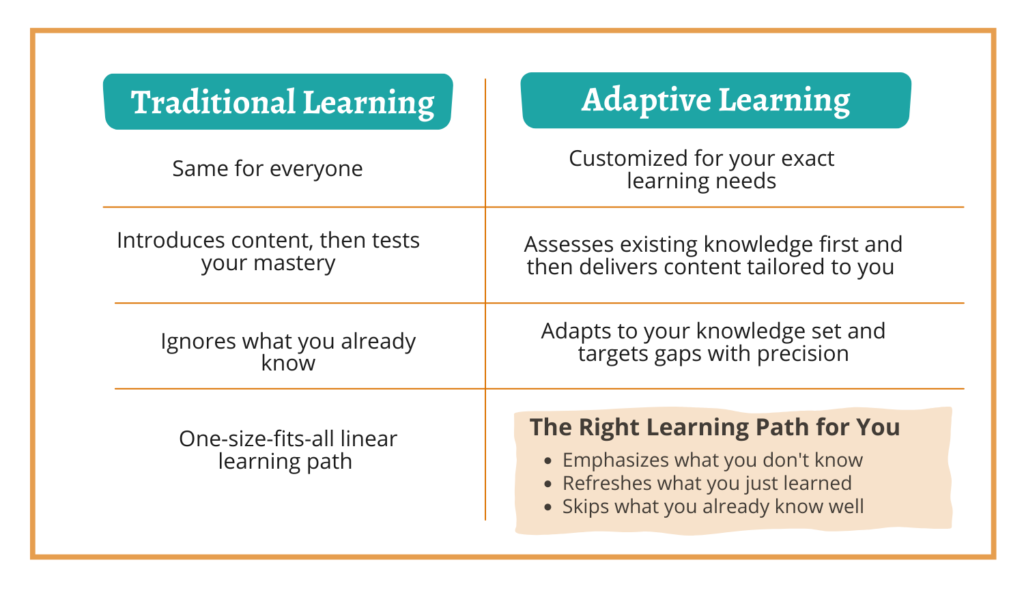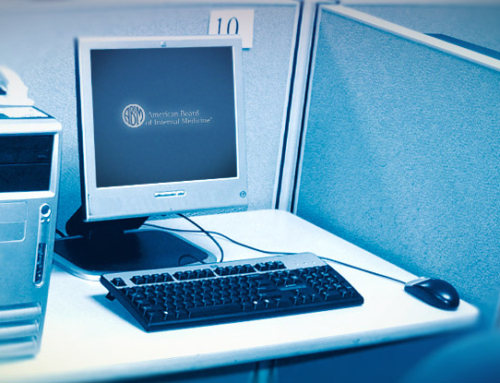If you’ve got an ABIM certification or recertification exam looming and you’re searching for the best Internal Medicine question bank, you’re in the right place. Myriad studies have shown that answering questions, a form of memory retrieval practice, is one of the best strategies for successfully preparing for and taking exams. And to help you make an educated decision about which IM question bank is right for you, we’ve compiled a list of key question bank features we believe you should consider.
We know a lot about question banks, but let’s acknowledge right off the bat that we’re a little biased. Of course, we hope you’ll choose NEJM Knowledge+ Internal Medicine Board Review, which delivers personalized learning, has more than 5,100 questions, two practice exams, and includes many other features that will help you pass your ABIM exam. But regardless of which ABIM question bank you choose, the following considerations will be beneficial when evaluating your options.
7 Reasons Why Internal Medicine Question Banks Enhance Learning and Recall
#1 The Testing Effect
Let’s begin with why you should use Internal Medicine QBanks to study and learn. If you know all about the testing effect and are already sold on using a question bank to study, then feel free to skip to the section: What to Consider When Searching for an Internal Medicine QBank. But if you want to understand why answering questions—leveraging the testing effect — is such an effective strategy (plus enhance your ability to learn in the process), keep reading.
The testing effect, in short, says that by testing your memory, you not only assess what you know, but you also enhance later retention. There are many reasons why testing yourself improves learning outcomes. One reason it works is because you engage in active learning.
#2 Active Learning vs Passive Review
Honor Schoech, MD, a Colorado internist who has recertified twice, responded to a survey we did a few years back about how physicians prepare for certification/recertification exams. Here’s what she had to say:
“Questions are the only way to go. It’s much more effective [than other study methods]. Answering the questions makes you think about the topic.”
Honor is onto something. As you answer questions, you actively pull out knowledge stored in your memory. This allows you to make connections to and integrate that knowledge with new information. This retrieval practice, as it’s known, reinforces learning, makes future recall easier, and strengthens long-term retention.
#3 Increased Metacognition
Stephen Russell, MD, another survey respondent and a double-board certified Internal Medicine Physician, used to study by reading study guides and working through the questions embedded within.
“Prospectively, I thought that studying the ‘core curriculum’ was more what I needed. Retrospectively, I needed the questions more,” reflects Russell. Answering questions has “honed my focus on knowledge gaps and allowed for quick learning points in reviewing the answers.”
When you grapple with a question, oftentimes, you’ll realize very quickly what you know and don’t know about the topic. Other times, you’ll think you know the right response, but then when provided with the actual answer, you’ll realize you didn’t know it or that you did not have the complete story. And sometimes you won’t feel confident at all in your response, only to find out that you knew more than you thought. By answering questions, you’ll not only uncover knowledge blind spots, you’ll also strengthen your intellectual self-awareness and metacognition. This, in turn, accelerates learning as you become more conscious of topics that warrant further exploration.
#4 Target Essential Knowledge
Questions help to pinpoint the specific information you need to learn to pass your exam (and accurately diagnose and successfully treat patients). Honor Schoech, MD, reflects that there’s too much information to tackle for exam prep — reading thousands of pages isn’t an effective option. She says, “Questions target your learning.”

But the questions can also serve as a springboard for deeper learning. You may realize that you want to dig more deeply into a topic. You can then use textbooks and online evidence-based tools to enhance your knowledge. Indeed, following up on a question by examining feedback about your response and expanding your learning about the topic leads to deeper understanding and better long-term retention. That’s why quality resources behind the answers to questions is an essential part of a good question bank. You can quickly move on if you feel confident with the topic, or access detailed feedback and resources if you get stuck or want to explore further.
#5 Testing is a Learning Event that Promotes Future Learning
Testing yourself also enhances learning as it primes your brain to be on the lookout for new and relevant information in the future. Answering questions promotes active recall, which is when you actively stimulate your memory to retrieve information. This triggers future learning, because your mind will become vigilant for related information as you collaborate with colleagues, attend courses, read journals, and interact with patients and their medical conditions. This cognitive process will also help you to remember the information on exam day and successfully apply what you have learned in your practice.
#6 Flexible and Empowering Microlearning
Microlearning — small lesson modules and short-term activities intended to both teach and reinforce learning objectives — is an innovative pedagogy that lets learners control the place, method, and time of access to information. Questions make for perfect bite-sized, stackable learning opportunities. You can fit questions into the “in between moments” of your life. Or, you can answer multiple questions at once and dive into the topics during focused study sessions. Between patients? Attend to a single question. Eating lunch? Devour five questions. Long layover between flights? Soar through 20 questions, or more! ABIM question banks empower you to learn anywhere, anytime, and for as long as you want.
#7 Simulate the Exam Experience with Practice Exams
Simulating the actual test environment is one of the most powerful ways to improve your score and reduce anxiety on exam day. Taking a timed practice exam will not only reinforce many of the benefits we’ve already discussed, but it also parallels the experience of taking the ABIM exam. Does the Internal Medicine question bank include timed practice exams so you can fine-tune your ability to apply effective strategies for working through ABIM questions?
What to Consider When Searching for In an Internal Medicine QBank
When looking for a quality Internal Medicine question bank, here are some key factors to contemplate:
- Content Trustworthiness and Quality Assurance: Is the question bank from an organization you trust? How can you be confident the questions are accurate, relevant, and rigorously reviewed? Do program directors and other medical educators give the content their stamp of approval? To gauge the quality of questions in a QBank, research how they are developed and reviewed. Is the process transparent and does it involve an in-depth quality assurance process that includes independent reviewers? Are questions developed and reviewed by practicing physicians like you who understand what you face day to day?
- Maximum Efficiency and Effectiveness with Adaptive Delivery: In examining various Internal Medicine question banks, consider whether question delivery is truly adaptive to enable the most efficient and effective use of your time. Does technology enable personalized question delivery based on your prior performance so you see more of what you need to learn and less of what you don’t? Some ABIM question banks use spaced repetition, which entails delivering questions at increasing intervals. This is very effective for optimizing long-term retention. But spaced repetition is only half of the adaptive delivery story. True adaptive delivery doesn’t just space questions further and further apart. It also delivers questions in different formats and clinical scenarios to assess and help you expand upon your ability to extend the knowledge to different clinical situations. In short, adaptive learning technology should ensure your time isn’t wasted on what you already know. Most board review products purport to having adaptive technology, but often don’t live up to their hype. Here’s a good table to help you evaluate their claims:

- Metacognition and Self-Awareness Strong metacognitive ability is essential in medicine. It affects your ability to reflect on your own thinking processes and recognize your cognitive biases, leading to more accurate diagnoses and better treatment decisions. Does the QBank you are evaluating come with tools for cultivating your metacognitive ability and self-awareness about your knowledge strengths and gaps?
- Relevant to the Exam and Your Medical Practice: To ensure questions are relevant, they should align to the ABIM Blueprint and center on issues Internists face in everyday practice. Make sure the question bank is continually updated based on the latest evidence-based guidelines and clinical practice standards.
- Feedback, Explanations, References, and Resources: Questions should be followed up with detailed feedback and explanations to help you understand why correct answers are right and incorrect answers are wrong. You should also have the ability to connect to reputable sources that provide supporting evidence and allow you to probe more deeply into topics to refine your understanding.
- # of Internal Medicine Questions: Medical knowledge is vast and growing exponentially, so the volume of questions is an indication of how well a question bank supports the scope of knowledge Internists require. Additionally, assessing knowledge via different question formats and in different contexts supports diverse learning preferences, solidifies knowledge, and will better enable you to apply the knowledge in real-life patient scenarios. The best question banks present information in a variety of contexts and in more than one question format. The volume of questions in the question bank is a good indicator of whether it meets these fundamental considerations.
But, more questions do not mean more time studying. A truly adaptive question bank will only serve questions to you if you need the reinforcement. - Formats and Variety of Question Type: The best Internal Medicine question banks should include case-based questions that match the format of the ones on the exam. And, as discussed above, should also include a variety of question types that not only support diverse learning preferences, but also stretch and advance different cognitive skills, such as problem-solving, analysis, synthesis, and the ability to make inferences in new contexts.
 CME Credits and MOC Points: It can’t be overstated: Your time is a precious commodity. So, it’s understandable that you will want to kill two (or three, or four) birds with one question bank. Ask yourself, “How many credits and points can I earn by using this question bank? And how easy is it for me to submit my points to ABIM?”
CME Credits and MOC Points: It can’t be overstated: Your time is a precious commodity. So, it’s understandable that you will want to kill two (or three, or four) birds with one question bank. Ask yourself, “How many credits and points can I earn by using this question bank? And how easy is it for me to submit my points to ABIM?”- Practice Exams: Most Internal Medicine board review products come with at least one practice exam. When sitting for the ABIM exam, you will encounter as many as 240 case-based questions that are specifically designed to challenge your clinical knowledge and analytical abilities while working within the limitations of a timed exam.
We believe practice exams are the best way to prepare for this high-stakes situation. We also think it’s optimal to take one practice exam at the beginning of your board prep journey to familiarize yourself with the experience and set a baseline, and then one just before the exam to practice for the big day. So, look for question banks that are paired with at least two practice exams. - Performance Reports: Since your primary goal for finding an ABIM QBank is to pass the Internal Medicine board exam, it’s essential to know where you stand and measure progress along the way. Look for reporting features that tell you:
- How you’re performing and whether you’re on schedule to meet your goals
- Which areas challenge you the most, so you can focus on those topics
- About your confidence levels to help you strengthen your metacognition
- How you are performing relative to your peers to provide you with informative benchmarks and powerful motivation
- Cost: Cost will be a factor for most people. Look for a question bank that offers value based on the factors in this list, along with other features you deem important. You can divide the total cost of the QBank product by the number of questions it contains to get a per question cost. Then, refer back to all your important considerations. What’s the bang for your buck?
 What Additional Supporting Resources Come with the IM Qbank? Will you gain free access to valuable journal content and foundational, distilled, topic-specific information? Career development and life balance resources? Other educational media and interactive tools for learning and sharpening your diagnostic abilities? Try listing out all the bells and whistles that come with the question bank you are considering, and then ask yourself, “Which of these features are just shiny objects designed to distract me, and which will add true value?”
What Additional Supporting Resources Come with the IM Qbank? Will you gain free access to valuable journal content and foundational, distilled, topic-specific information? Career development and life balance resources? Other educational media and interactive tools for learning and sharpening your diagnostic abilities? Try listing out all the bells and whistles that come with the question bank you are considering, and then ask yourself, “Which of these features are just shiny objects designed to distract me, and which will add true value?”
The best ABIM question banks are developed based on the above list of essential considerations. We hope the list will help you in your search for an IM QBank, even if you don’t choose ours. But to make sure you have all the information you need about NEJM Knowledge+ Internal Medicine Board Review, we’ve outlined a few of the reasons why we think you should consider our internal medicine question bank below.
Reasons to Consider NEJM Knowledge+ Internal Medicine Board Review
At NEJM Knowledge+, we understand what works and what doesn’t when preparing for the Internal Medicine exam. In fact, NEJM Knowledge+ Internal Medicine Board Review has been engineered with all of the above considerations top of mind. For example:
Our 5,100+ gold-standard questions — the largest and most comprehensive Internal Medicine question bank available — are not just mapped to the ABIM Blueprint. They are created and reviewed via our rigorous editorial process to ensure the quality and standards you’ve come to trust from NEJM Group.

Our Adaptive Learning algorithm not only uses spaced repetition to deliver questions to you in intervals that promote long-term retention. It also tests your knowledge in different contexts and question formats so you develop the deep understanding you’ll need when answering the case-based questions you’ll see on the ABIM exam. The adaptive learning algorithm won’t waste your valuable time asking you questions about topics you’ve already mastered. Instead, it will tailor your learning experience in real-time to create the perfect learning path for you, saving you hours.
NEJM Knowledge+ Internal Medicine Board Review will also amp up your metacognition by asking you to consider how confident you are about the questions as you answer them. You’ll be prompted to “think about your thinking,” which will strengthen your metacognitive muscle, helping you tackle questions on exam day adeptly and with confidence.
The program has two timed practice exams, performance reports with actionable data that will make you a more efficient and effective learner, and a Credits Center that keeps track of and automatically reports your MOC points and CME credits.
In other words, we think NEJM Knowledge+ is THE Internal Medicine question bank you need to prepare for and pass your ABIM certification exam!
Additional Internal Medicine Prep Resources
- ABIM Study Plan
- ABIM blueprint
- Survival Guide for ABIM Exam Day
- Study for IM Boards on the Stairmaster
- Your Guide to ABIM MOC Requirements
- Residency as a Study Tool









